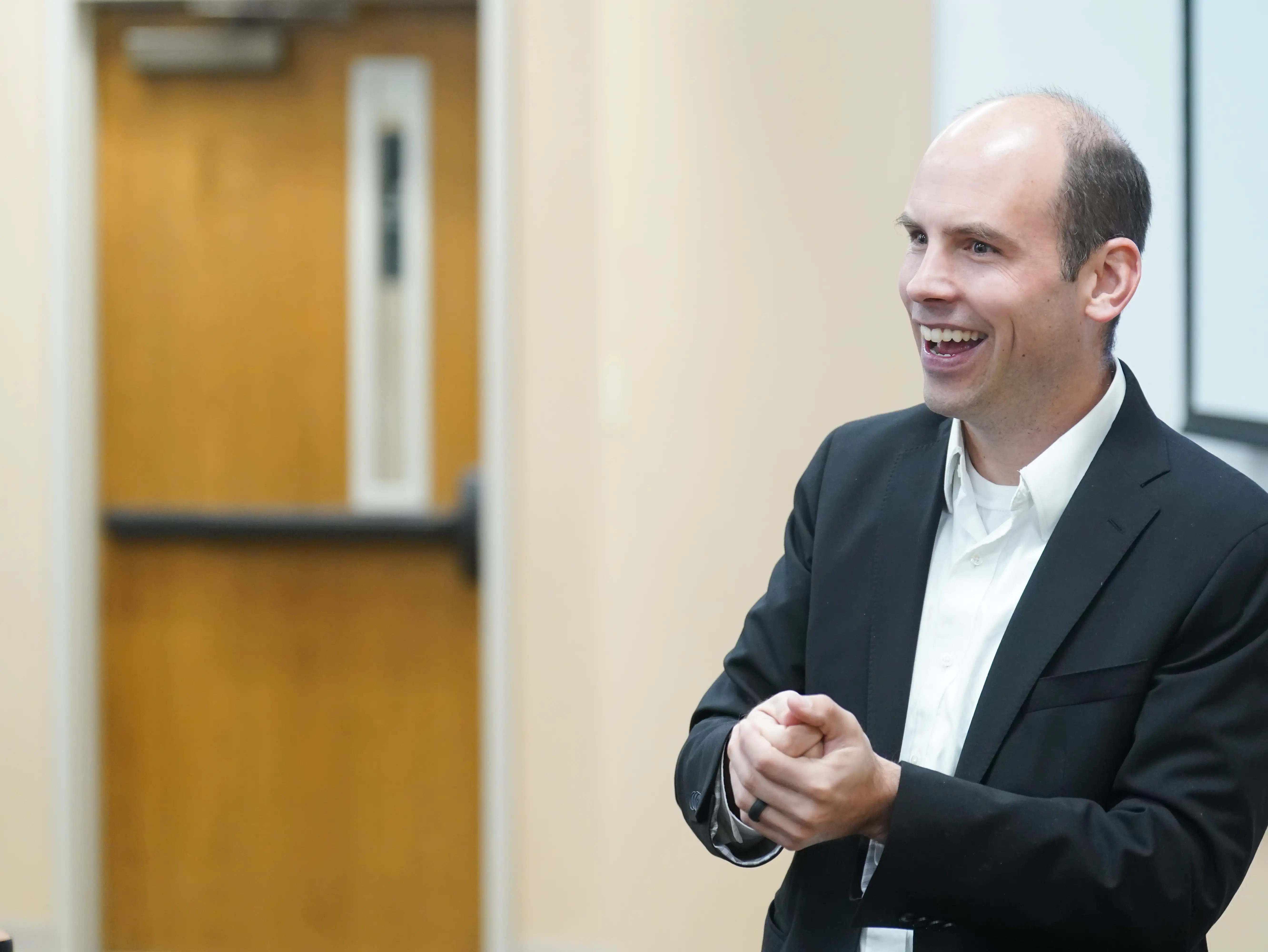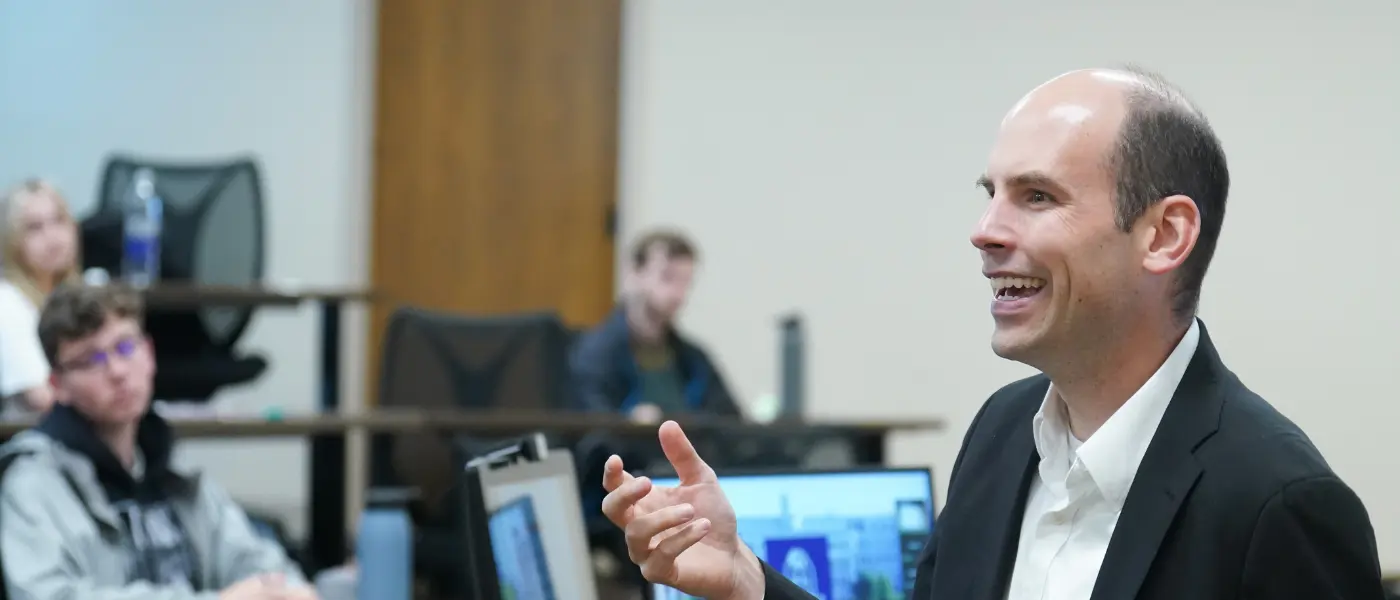Professor Haskell Murray brings over a dozen years of teaching experience to his courses in business law, negotiations and ethics. He encourages students to move beyond rules and procedures and to wrestle with deeper questions of character, virtue and moral responsibility.
Reading as a Moral Act
Recently, Professor Murray took part in a formation-focused faculty reading group led by Belmont President Greg Jones and Nathan Webb, VP of Formation & Leadership. The discussions were formative both in their content and in the attention and virtue required to engage thoughtfully.
Two books in particular stood out: The Good Life Method by Meghan Sullivan and Paul Blaschko, which sparked ideas for classroom discussion, and The Character of Virtue: Letters to a Godson by Stanley Hauerwas. The latter struck Murray for its substance and tone.
The book compiles annual letters Hauerwas wrote to his godson, each centered on a particular virtue. “I think what affected me most was Hauerwas’s commitment to feeding back into the next generation,” Murray said. “That's what we professors should be doing—passing on hard-won wisdom, along with our mistakes.”
Hauerwas’s approach, Murray noted, is marked by honesty about his own weakness. “The biggest pitfall in this work is appearing as if we have all the answers,” he said. “Hauerwas teaches his godson about the virtue of patience while admitting that he struggles with the vice of impatience all the time. As professors, we need to make ourselves part of the examination and present moral formation as a common struggle.”
Reading alongside colleagues became another kind of practice. “Reading is a moral act,” Murray said. “The writer George Saunders calls it ‘empathy training wheels’—and I think he’s right.”
The conversations among faculty that took place required careful listening and space-making. For Murray, those habits of attention may have been just as formative as the readings themselves.
Formation in the Business Law Classroom

In his business law classes, Murray makes a point of returning to the principles that underlie course content.
“Why do we have laws at all? Why checks and balances?” He asks his students. He guides them toward considering human susceptibility to selfish impulses and the dangers of absolute authority, among many other moral questions.
These questions are not, for him, philosophical tangents; they are central to becoming good business leaders, lawyers and people. “If you dig deep enough into any subject, you’ll find fundamental questions about human nature, justice and virtue,” he said.
Formation, however, is not only about content, but also about posture.
“One change I’ve tried to make is to react with curiosity rather than frustration when a student misses class or struggles on an exam,” Murray said. “The vast majority of the time, those students are dealing with more difficulties than we may imagine. Curiosity opens space for compassion.”
Murray’s reflections on formation are also shaped by his life outside the classroom, especially as a father of three. “I’m constantly reminded that most moral formation is caught, not taught,” he said. “That’s a good reminder for us as professors — that our students are watching us. The whole discussion about character formation can be undone if we live in opposition to what we teach.”
Models of Character
In addition to these recent conversations among faculty, Murray traces much of his thinking around formation to people who modeled integrity and attentiveness in their own work.
His high school football team’s strength coach, Darrell Wyke, trained him for free one summer, knowing he wanted to play in college. “He paid enough attention to know what I wanted and brought me in,” Murray said. “We would show up early, and he’d already been there for an hour, working on his own routine. He was out in front of us, doing the work.”
In law school, his professor Marjorie Knowles modeled another form of discipline. “She might have talked the least in the class,” Murray said. “But she would plant a question here or an observation there and let the class lead. Her demeanor was instructive.”
And at home, his wife’s example shapes his teaching. “She has incredible emotional intelligence,” he said. “She reminds me to ask better questions.”
The examples of character models in his own life make Murray more acutely aware of his responsibility to form, through action, those who are watching.
A Place That Forms
Murray expressed gratitude to be at a university that elevates character formation as an essential endeavor.
“In an era where we’re all pulled toward ever-increasing efficiency with not a lot of thoughtfulness around why we do what we do, we need to be especially intentional in asking: what is our purpose?”
Murray emphasized that the work of character formation may not always feel urgent, but it’s deeply important, and he’s delighted to participate in Belmont’s mission to embody that conviction in everyday life and work.
Learn More
Learn more about the Jack C. Massey College of Business.

